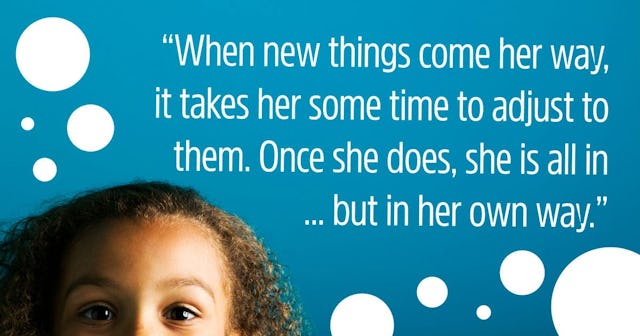Young Kids Can Be Introverts Too

When friends or family stop by my home for a visit, one of my youngest twin daughters cries, without fail, almost immediately. She covers her ears when the mix of conversations, her siblings arguing, and the noise of the TV becomes too much. She sobs at my feet. But when things are calm, and as she starts to become well-adjusted to adding one or two more people inside an already full household, she settles into the idea of having company and enjoys showing off her charming personality.
The thing is, it’s short-lived.
It doesn’t matter where we are; if we spend time surrounded by more folks than those in her immediate family, or even in a place that isn’t her home, she tires easily. It isn’t until she’s back in a comfortable environment that we see those ear-to-ear smiles and hear those great big toddler giggles. This isn’t to say that she doesn’t enjoy other people or new places, because she absolutely does — but when she is out of her normal routine, it tends to take more out of her than it would with other kids.
At just two years old, it is plain as day that my daughter is an introvert. Unlike her extroverted twin sister, being “the life of the party” isn’t something that always comes naturally to her. She finds her fill in the one-on-one time spent with others, not the hustle of quick and nonchalant greetings among several individuals all in the same social setting. When new things come her way, it takes her some time to adjust to them. Once she does, she is all in … but in her own way.
Because of this, and the way society interprets introversion, as well as my lack of knowledge on how to parent an introvert until I became her mother, I’ve spent much time worrying about her. Really, though, having an introverted young child is nothing to fear and completely normal.
Kenneth Rubin, Ph.D., professor of human development at the University of Maryland, and a coeditor of The Development of Shyness and Social Withdrawal explains, “We want our kids to be the most outgoing kids in the world, but if we go to Beijing, the typical response to a reserved preschooler is that he’s fantastic. Culture defines what’s appropriate.”
Cavan Images/Getty
In our culture, my daughter’s sensitivity and soft spirit can be frowned upon. She takes the world to heart and stews on things before acting on them, and we’ve been conditioned to believe that this isn’t always a good thing. Although there’s been more social acceptance on introversion lately, it is still widely misunderstood in young children. As a result, kids are being molded into someone they are not.
Let’s take the “shy” kid we all remember from elementary school, for example. You know the one… the kid who kept to themselves and was always being called on by teachers by means of trying to push them out of their bubble.
When I look back on these classmates, I wonder if peers, teachers and those in authority were doing them a disservice. Don’t get me wrong, learning how to be social is an important aspect in one’s life (we can’t always stow away like a hermit crab), but we need to understand that every child engages with society in their own way.
These kids we perceived as shy might not have been shy at all. More than likely, they weren’t withdrawn, sad, or lonely standing along the outskirts of the crowd; they probably just enjoyed taking it all in from afar more than others. We need to realize that just because a child keeps to themselves, that doesn’t mean they are struggling with social anxiety or are bashful … they just might have an introverted personality.
I’ve had to be careful with my own daughter not to put my own feelings about her introversion onto her. More importantly, I’ve been forced to understand that another child’s differing temperament has nothing to do with her own. Meaning, if she’s happy playing with her toys all alone in the corner of the room unlike her twin sister who demands my attention every moment of every day, I cannot always assume that something is emotionally, behaviorally or mentally “wrong” with my little introvert.
Her siblings are wired differently than her, but that doesn’t mean she was made with a faulty wire. This is just her. She doesn’t get as much fulfillment out of being a social butterfly. One-on-one interactions are what she lives for. She is a “stop and smell the roses” type of child, and I don’t know about you, but I’m watering that seed.
I’m not perfect, and I’m still learning how to navigate her introversion alongside her. I take interest in the things she enjoys when she wants to let me in on them. I sit on the sidelines of events when the chaos of it all becomes too much for her. And, my favorite, I snuggle her when she’s met with the most depleted states following a social gathering.
My toddler is an introvert, and I wouldn’t change a single thing about her.
This article was originally published on